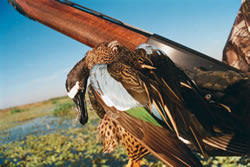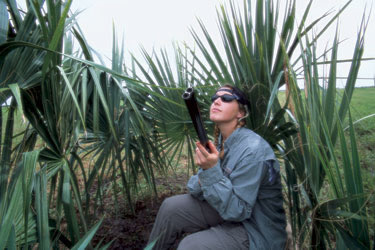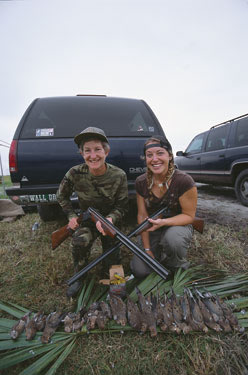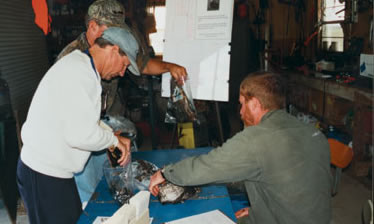May 16, 2011
By Terry Gibson
The next generation of Florida hunters faces new opportunities and new challenges.

Bluewing teal are plentiful on St. Johns and South Florida district lands that welcome hunters. |
Sixteen-year-old Read Wolfe shot his first duck last season, and he shot it on Stormwater Treatment Area 1 West, in Palm Beach County, during its first year as a Small Game Public Hunting Area.
The area, referred to as an STA, is a manmade marsh designed to cleanse water draining off South Florida agricultural lands. It's a part of Everglades restoration, but it also represents a tremendous resource for waterfowl hunters residing in an otherwise urban environment.
Opportunities such as this are critical to the future of hunting. State authorities and sportsmen's advocacy groups agree that to pass on our hunting heritage to the next generation, Florida must focus on boosting license sales, properly managing wildlife populations, opening access to existing public lands and more aggressively pursuing new opportunities, like the STAs.
Read has successfully hunted deer, turkeys and hogs, but duck hunting was a new challenge for him. It was a chilly January afternoon, with strong winds out of the northwest. The lad's teeth began chattering while I quacked and whistled at passing ducks. He did not complain, not once, even as wary, late-season birds circled at the edge of range.
“Wow, they're fast,” Read said.
“Don't stop your swing,” I coached him.
There came a lull, then a flight of teal appeared over the north end of the marsh. The birds circled twice, and then Read stood and swung.
“Great shot, Read!” I sprinted after the bird, determined that he would get to clean and eat his first duck.
I had a lot invested in that duck. Read's success validated almost four years of activism.
On a personal and editorial level, I've been involved with a diverse group of Everglades stakeholders, including United Waterfowlers of Florida,
Delta Waterfowl, Audubon Society, the bass angler's group S.A.F.E.R., the Airboat Association of Florida and officials from the Florida Fish and Wildlife Conservation Commission (FWC) and South Florida Water Management District (SFWMD).
What I've observed is a model of how public land management is likely to work in the future.
These groups, working together, overturned “bureaucratic inertia” and opened some doors to hunting access on lands designated for water management purposes. Today, there are regular hunts held on the STAs and a comprehensive recreation guide to South Florida Water Management District lands. The FWC manages the hunts (some of the state's best), and there is fishing and other recreation on much of the District's 375,000 acres. (To get a copy of the Recreational Guide, visit www.sfwmd.gov.)
For the 2005/06 season, the District will allow hunting on the 16,000-acre STA 3 and 4, which almost doubles the amount of duck hunting access on district lands.
While the opportunities on SFWMD lands are exciting, one major diplomatic breakdown occurred. Two years ago, the District entered into an annexation agreement with the city of Wellington that destroyed any chance of hunting on STA 1—a huge, duck-friendly marsh. The city, like others in Florida, has an ordinance forbidding the discharge of firearms within municipal boundaries. Sources say Wellington needed the marsh to stay concurrent with green space laws; others imply that the deal was pushed through by a powerful developer that owns agricultural lands on the other side of Highway 80. With STA 1 a part of Wellington, the zoning could be changed to residential status. Recreational access is planned for the marsh, but hunting probably won't be allowed unless Wellington adjusts its firearms ordinances.

Young hunters must be recuited if wildlife habitat and the sport itself are to survive. |
In Texas, state legislators passed a law to prevent cities from stopping hunting when they annex lands, and Florida hunting advocates are interested in passing a similar law here. But for now, annexation of wilderness areas by municipalities poses a major threat to public hunting lands statewide.
The St. Johns Water Management District was about to enter into a similar agreement with Palm Bay. At the last minute, United Waterfowlers of Florida got wind of the deal, which would have taken 29 square miles of marsh away from hunters and airboaters north of the T.M. Goodwin area. Hunters and other recreational users rallied, and after a number of subsequent meetings, the deal was killed.
“The District and Palm Bay both worked in good faith with us,” said United Waterfowlers President Newton Cook. “We were very surprised, and more than a little grateful, when they told us they had decided against annexation.”
Most recently, United Waterfowlers of Florida fought off a Duval County (Jacksonville) ordinance proposal that would have banned firearms at all parks, boat ramps and marinas, which of course would have killed public hunting in the county. The proposal was short-lived, but Cook can't afford to take time out to celebrate.

FWC holds more than 60 dove hunts each year. Such opportunities create the enthusiasm critical to the future of public hunting. |
“As more non-hunters move to the state, we're going to have to keep playing whack amole against challenges to our hunting heritage and our wildlife,” he said. “We're gonna need all the help we can get.”
Most statistics related to hunting in Florida are discouraging. Hunting license sales are down, way down—40 percent since 1980. Hunters licensed in the state now represent less than one percent of the population, a population that is growing almost exponentially but without many new hunters.
“Hunting represents only 27 percent of FWC's hunting-related budget, and contributes but one-seventh of the funding for Wildlife Management Areas,” said FWC Executive Director Ken Haddad, at the August 2005 Future of Hunting in Florida Summit. Yet, Haddad pointed out, Florida is ninth in state-owned land holdings open to public hunting (151 Wildlife Management Areas encompassing 5.6 million acres) and fifteenth in terms of land per hunter (31 acres per hunter).
But owning and managing Florida land is expensive for both the public and private sector, and recently the Florida Department of Environmental Protection (FLDEP) and FWC were directed to identify all “non-essential” lands, presumably to provide housing for the 91 million people expected in Florida by the next century.
“FWC remains a strong advocate for hunting,” said Haddad. “In fact, in July 2005, FWC created a Division of Hunting and Game Management. Partnership is the solution...with FWC...with other groups and interests. Without new approach and vision, our hunting will almost certainly lose its place in Florida tradition. The hunting community and leaders must learn and practice leadership. Bring us all together, not just hunters, and take the lead.”
The summit in August was sponsored and attended by a remarkably diverse group of stakeholders. The cast included sporting advocacy groups such as Allied Sportsmen's Association of Florida, Delta Waterfowl and the National Wild Turkey Federation of Florida, government agencies including the Florida Division of Forestry, and large private landowners including St. Joe Company.
While Haddad's presentation did not address the S-word, sprawl, of the urban variety, or the F-word, fragmentation, as in fragmentation of individual and inter-connected habitats by development, those threats were discussed at length.
“Hunting is in the best interests of all Floridians, whether they realize it or not,” said Lane Stephens, Executive Director of the Allied Sportsmen's Associations of Florida. “Our demand for hunting lands, both public and private, keeps woods and farms intact. Those habitats protect our wildlife populations, the trees that generate the oxygen we breathe and clean recharge areas for our aquifers. They even prevent additional urban runoff from impacting our fisheries,” he explained.
FWC remains a strong advocate for hunting. In July 2005, FWC created the Division of Hunting and Game Management. |
|
To preserve Florida's presently healthy populations of deer and our thriving, indigenous turkey, the Osceola bird (as well as other wide-ranging species including black bears and panthers), large, contiguous swaths of wilderness containing diverse habitats must be protected.
“No WMA can survive as an island,” said Jack Moller, Florida Wildlife Federation's first life member, during his summit presentation. “We've got to work with FWC on WMA management, otherwise public hunting areas such as the J.W. Corbett Area (Palm Beach County) will get surrounded by concrete and become a South Florida version of Central Park.”
Moller also pointed out the need to incentivize private landowners to hold onto their real estate, despite strong temptations to sell out to development.
“We have to find ways to make endangered species habitat an asset, not a liability. It's all about the money,” he said.
Wildlife managers from Lykes Brothers and St. Joe Timberland Company said that lease arrangements with hunters are key to preserving the 13.5 million acres of private hunting lands (and habitats) in Florida. Steve Shea, wildlife manager for St. Joe, showed that the variables in the present equation—a depressed wood market, highly variable cattle and crop prices, and escalating land values—add up to “land for sale.”
“Revenues from hunting leases help us keep up with skyrocketing property taxes,” he said, adding that revenues from hunting leases in Florida generate more than $75 million annually for landowners statewide.
Lykes Brothers Land Manager John Tallent pointed out that having hunters patrolling their land adds a security value for landowners, and that lease agreements reduce liability concerns. Tallent also pointed out that the habitat improvements that lessees and landowners make increases the value of the lease. But there aren't any other incentives for landowners to say “no” to developers. In fact, the Endangered Species Habitat Act can take land out of production, which creates a disincentive to keep the land in agriculture.

T.M. Gooodwin Waterfoul Management Area west of Vero Beach is a model partnership between Ducks Unlimited and the FWC. Here hunters check a daily bag of ducks. |
“All the tools we need to preserve wildlife and our hunting heritage are being used in other states. We need programs such as tax incentives for wildlife management and/or public hunting opportunities through partnerships with FWC,” said Stephens.
“Incentives are imperative,” agreed Shea and Tallent.
Of course, such concepts have to get political legs, and the summit identified “animal rights” activists and bureaucratic resistance from water management districts and federal agencies as the major obstacles. But preserving Florida's hunting heritage may not be as much of an uphill battle as you might think.
Former Audubon of Florida president and hunter Stuart Strahl, who played an important role early on in the creation of a recreation access plan for the South Florida Water Management District's tremendous land holdings, talked about conservation as America's natural common ground. He informed delegates that the 2000 National Survey on Recreation and the Environment showed that 97 percent of all Americans enjoy knowing wilderness areas will be protected for future generations. The study also showed that 73 percent approve of legal hunting and 81 percent think hunting should continue. Citing America's 71 million anglers, 69 million birdwatchers, 69 million hikers, 23 million hunters and 20 million equestrian enthusiasts, Strahl said, “Conservationists of all types could deliver 65 percent of the voting public.”
Already, Florida hunters have an opportunity to carry a very important political football, one that would guarantee no net loss of hunting lands in the state, and that would open all water management district lands unless valid reasons to prevent public access can be substantiated.
Florida Senate Bill 430, sponsored by Sen. Nancy Argenziano, R-Crystal River, and HB 265, a companion bill introduced by Rep. Donald Brown, R-DeFuniak Springs, direct the FWC to prevent the net loss of available state hunting land. The “no net loss” directive requires the state to open compensatory huntable land if an area is closed to the sport.
If it becomes law, the bill would also require that “any agency or water management district that owns or manages state lands shall assist and coordinate and cooperate with the commission (FWC) to allow hunting if such lands are determined to be suitable for hunting by the commission.”
“The state has bought more than a million acres under the Bush Administration, and there is no reason why hunters should not have access to those lands,” said Marion Hammer, Executive Director of Allied Sportsmen of Florida.
FS

